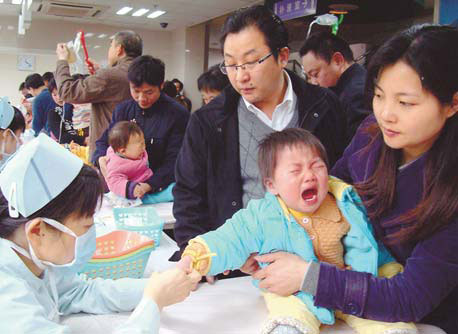Society
Doctors at receiving end in medical reform
By Wang Shanshan in Beijing (China Daily)
Updated: 2010-03-25 06:44
 |
Large Medium Small |
Tense relations
 |
|
A child gets a shot at the clinic. [WANG JIANKANG/FOR CHINA DAILY] |
Expensive treatments and irresponsible doctors are causing an increasing number of medical disputes and lawsuits against hospitals and healthcare professionals, say experts.
More than 10,000 court cases over medical disputes are filed every year in China, said Deng Liqun, director of legal affairs for the Chinese Medical Doctors' Association.
The trend is not good news for doctor-patient relations. The study by Peking University showed that less than two-thirds of the physicians polled believe their patients respect them. "The pressure doctors feel from this tense relationship is so great that it is hard to imagine," added Dr Chen in Beijing.
The existing evaluation system, which increases a doctor's incentive to sell expensive medicine and reduces their willingness to take care of patients, began in the early 1990s when hospitals became part of the market economy, said Dr Zheng. "The emphasis on revenue has grown stronger than ever in the last several years," he said.
Hospitals were fully funded by the government until the early 1990s, when medical reforms started. They then had to earn the majority of the money that they need, while still getting some subsidies from the government.
In 2005 the government admitted that the medical reform was a failure. Ge Yanfeng, an official at the Development Research Center of the State Council, told the press at the time: "Until now China's medical reform has been largely unsuccessful."
He quoted a report of his institution to state leaders. It said: "There are big problems with the current reform. The passive effects are that the fairness of the medical service is reduced and that the efficiency of the state input is low. It is absolutely wrong that the healthcare system is on the way to become a business and a market."
Medical reforms came to a halt in 2005 and discussions have been ongoing since then about how to launch a new reform. However, little has been said about solving the problems created by previous reforms.
"The healthcare system, which is halfway to being market-driven, urgently needs changes," said Hu Xingdou, an economics professor at Beijing Institute of Technology. "Public hospitals are on one hand monopolies, but they are also under pressure to earn their own money. So they must exploit their status to generate revenue.
"Public hospitals are managed like State-owned enterprises and doctors are often treated like ordinary workers, not professionals. Private hospitals, which are new in China, are limited in many ways and still struggle to attract doctors from public hospitals."
Private medical centers first appeared in China in 1995 and, by 2006, there were about 4,000 nationwide, according to the China Healthcare Development Report, which was published by the Social Sciences Academic Press. Meanwhile, there were 16,000 public hospitals in 2007, according to figures from the National Bureau of Statistics.







